
Until the End of the World is a 1991 epic science fiction adventure drama film directed by Wim Wenders. Set at the turn of the millennium in the shadow of a world-changing catastrophe, the film follows a man and woman, played by William Hurt and Solveig Dommartin, as they are pursued across the globe, in a plot involving a device that can record visual experiences and visualize dreams. An initial draft of the screenplay was written by American filmmaker Michael Almereyda, but the final screenplay is credited to Wenders and Peter Carey, from a story by Wenders and Dommartin. Wenders, whose career had been distinguished by his exploration of the road movie, intended this as the ultimate example of the genre.

Laurence Joseph Mullen Jr. is an Irish musician, best known as the drummer and co-founder of the rock band U2. A member of the band since its inception, he has recorded 15 studio albums with U2. Mullen's distinctive, almost military drumming style developed from his playing martial beats in childhood marching bands.

Achtung Baby is the seventh studio album by Irish rock band U2. It was produced by Daniel Lanois and Brian Eno, and was released on 18 November 1991 on Island Records. After criticism of their 1988 release Rattle and Hum, U2 shifted their direction to incorporate influences from alternative rock, industrial music, and electronic dance music into their sound. Thematically, Achtung Baby is darker, more introspective, and at times more flippant than their previous work. The album and the subsequent multimedia-intensive Zoo TV Tour were central to the group's 1990s reinvention, by which they abandoned their earnest public image for a more lighthearted and self-deprecating one.

Daniel Roland Lanois is a Canadian record producer and musician.

All That You Can't Leave Behind is the tenth studio album by Irish rock band U2. It was produced by Brian Eno and Daniel Lanois, and was released on 30 October 2000 through Island Records and Interscope Records. Following the band's experimentation with alternative rock and dance music in the 1990s and the mixed reception to their 1997 album, Pop, U2 returned to a sound more akin to their earlier records for All That You Can't Leave Behind. The group reunited with Eno and Lanois, who had produced three prior U2 albums together. The record was originally named "U2000", which had been a working title for their PopMart Tour.
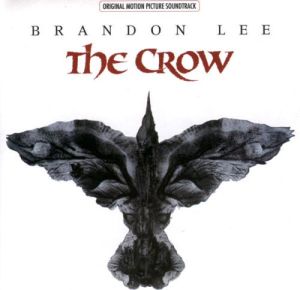
The soundtrack to the superhero film The Crow was released in 1994.
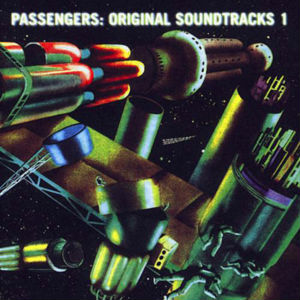
Original Soundtracks 1 is a studio album recorded by rock band U2 and Brian Eno under the pseudonym Passengers as a side project. Released on 6 November 1995, the album is a collection of songs written for mostly imaginary films. Owing to Eno's involvement as a full songwriting partner and the album's experimental nature, the moniker "Passengers" was chosen to distinguish it from U2's conventional albums. It was commercially unnoticed by the band's standards and received generally mixed reviews. Guest musicians on the record included Italian opera singer Luciano Pavarotti and producer Howie B, who would co-produce U2's following album, Pop (1997).
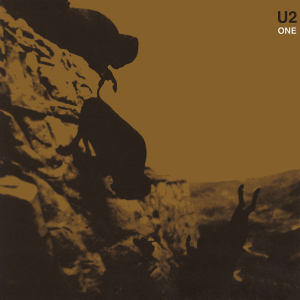
"One" is a song by Irish rock band U2. It is the third track from their seventh album, Achtung Baby (1991), and it was released as the record's third single on 24 February 1992. During the album's recording sessions at Hansa Studios in Berlin, conflict arose between the band members over the direction of U2's sound and the quality of their material. Tensions almost prompted the band to break up until they achieved a breakthrough with the improvisation of "One"; the song was written after the band members were inspired by a chord progression that guitarist the Edge was playing in the studio. The lyrics, written by lead singer Bono, were inspired by the band members' fractured relationships and the German reunification. Although the lyrics ostensibly describe "disunity", they have been interpreted in other ways.
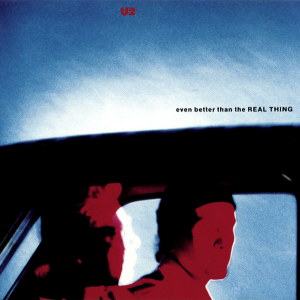
"Even Better Than the Real Thing" is a song by Irish rock band U2, and is the second track on their seventh album, Achtung Baby (1992). It was released as the album's fourth single on 8 June 1992, and it reached number three in Ireland and Canada while becoming a top-ten hit in Austria, New Zealand, and Sweden. A remixed version of the song released the same year peaked at number eight in the United Kingdom and number 10 in Ireland. In 1997, readers of Mojo named the song the 71st-best track of the 1990s.
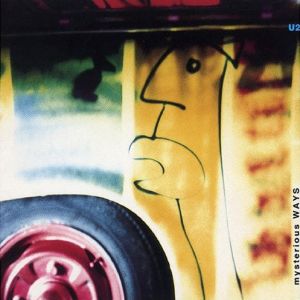
"Mysterious Ways" is a song by Irish rock band U2. It is the eighth track from their 1991 album, Achtung Baby, and was released as the album's second single on 2 December 1991, two weeks after the album. The song began as an improvisation called "Sick Puppy", with the band liking only the bass part that bassist Adam Clayton composed. The band struggled to build a song from it, with vocalist Bono and producer Daniel Lanois arguing intensely during one songwriting session. The song's breakthrough came after guitarist the Edge began experimenting with the Korg A3 effects unit. "Mysterious Ways" features a danceable beat, funky guitar hook, and conga-laden percussion, as well as mystical lyrics by Bono about romance and women.

"The Fly" is a song by Irish rock band U2. It is the seventh track from their 1991 album, Achtung Baby, and it was released as the album's first single on 21 October 1991 by Island Records. "The Fly" introduced a more abrasive-sounding U2, as the song featured danceable hip-hop beats, industrial textures, distorted vocals, and an elaborate guitar solo. Lead vocalist Bono described the song as "the sound of four men chopping down The Joshua Tree", due to its departure from the sound that had traditionally characterised the band in the 1980s.
"Zoo Station" is a song by Irish rock band U2. It is the opening track from their 1991 album Achtung Baby, a record on which the group reinvented themselves musically by incorporating influences from alternative rock, industrial, and electronic dance music. As the album's opening track, "Zoo Station" introduces the band's new sound, delivering industrial-influenced percussion and several layers of distorted guitars and vocals. Similarly, the lyrics suggest the group's new intents and anticipations. The introduction, featuring an "explosion" of percussion and a descending glissando for a guitar hook, was meant to make the listener think the album was mistakenly not U2's latest record or that their music player was broken.
"Until the End of the World" is a song by rock band U2 and the fourth track from their 1991 album Achtung Baby. The song began as a guitar riff composed by lead vocalist Bono from a demo, which the band revisited with success after talking with German filmmaker Wim Wenders about providing music for his film Until the End of the World. The song's lyrics describe a fictional conversation between Jesus Christ and Judas Iscariot. The first verse discusses the Last Supper; the second is about Judas identifying Jesus with a kiss on the cheek in the Garden of Gethsemane; and the final is about Judas' suicide after being overwhelmed with guilt and sadness.

Robbie Robertson is the solo debut album by Canadian rock musician Robbie Robertson, released in 1987. Though Robertson had been a professional musician since the late 1950s, notably a founder of and primary songwriter for The Band, this was his first solo album. Robbie Robertson won the Juno Award for "Album of the Year", and producers Daniel Lanois and Robertson won the "Producer of the Year" Juno award, both in 1989; there were no Juno Awards in 1988.

No Line on the Horizon is the twelfth studio album by Irish rock band U2. It was produced by Brian Eno, Daniel Lanois, and Steve Lillywhite, and was released on 27 February 2009. It was the band's first record since How to Dismantle an Atomic Bomb (2004), marking the longest gap between studio albums of their career to that point. The band originally intended to release the songs as two EPs, but later combined the material into a single record. Photographer Anton Corbijn shot a companion film, Linear, which was released alongside the album and included with several special editions.
Bambi Lee Savage is an American singer, songwriter and musician who also has worked as an audio engineer, most notably assisting on U2's Achtung Baby. Her song "Darlin'" was featured on the Sling Blade film soundtrack and her four independently-released albums are Matter of Time (2003), GJ and the PimpKillers (2009) Darkness Overshadowed (2012) and Berlin-Nashville Express (2019).

From the Sky Down is a 2011 American documentary film directed by Davis Guggenheim about rock band U2 and the production of their 1991 album Achtung Baby. The film documents the album's difficult recording period, the band members' relationships, and the group's creative process. Guggenheim, who was commissioned by U2 to create the film to commemorate the record's 20th anniversary, spent several months in 2011 developing the documentary. The band were filmed during a return visit to Hansa Studios in Berlin where parts of the album were recorded, and during rehearsals in Winnipeg for the Glastonbury Festival 2011. The film contains unreleased scenes from the group's 1988 motion picture Rattle and Hum, along with archival footage and stills from the Achtung Baby recording sessions. Development of the album's emblematic song "One" is recounted through the replaying of old recording tapes.
"Love Is Blindness" is a song by rock band U2, and the twelfth and final track on their 1991 album Achtung Baby. The song was written on piano by lead singer Bono during the recording sessions for U2's 1988 album Rattle and Hum. Originally intending to give the song to singer Nina Simone, the band decided to keep it for Achtung Baby after playing it together. Thematically, the song describes a failing romance, mixing personal themes with imagery of metaphorical acts of terrorism. During the recording sessions for Achtung Baby, guitarist the Edge separated from his wife, Aislinn O'Sullivan. The separation had a major effect on the development of the song; Bono said that the ending guitar solo was a cathartic experience for the Edge, as he snapped several guitar strings during the recording.
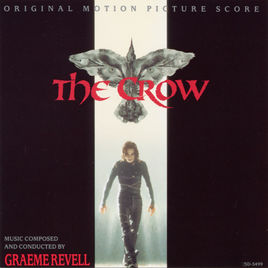
The Crow: Original Motion Picture Score contains original music written by Graeme Revell for the film The Crow. It was released in 1994. It should not be confused with the soundtrack album, The Crow, which showcases the film's music by popular artists.















